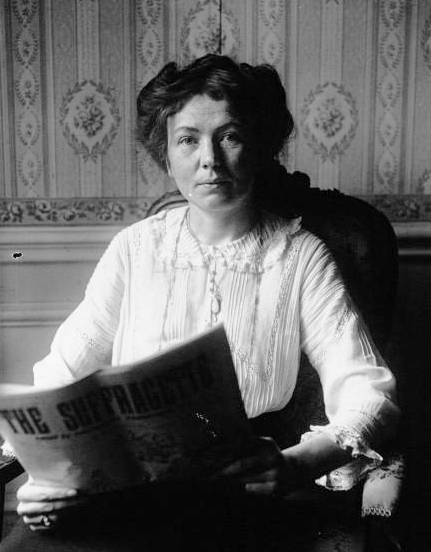Christabel Pankhurst
Christabel Pankhurst, along with her mother Emmeline and sister Sylvia, was one of the driving forces of the Suffragette movement. While Sylvia left the WSPU in 1914 in opposition to the organisation’s support of the war, Christabel remained a dedicated member.
Born on 22 September 1880, Christabel’s father was a radical socialist whose beliefs greatly influenced his children. Christabel studied at the Manchester High School for Girls and obtained a Law degree from Manchester University. Although she received honours on her LLB degree, she was not allowed to practice law because of her sex.
Christabel met fellow NUWSS member, Eva Gore-Booth, in 1901. Gore-Booth was working with working class women and trying to convince them to join the NUWSS in Manchester. Christabel, along with Sylvia and Emmeline Pankhurst were strong supporters of women’s suffrage. However, the NUWSS supported peaceful protest based on rational arguments. The Pankhurst’s came to the conclusion that the NUWSS was too passive to achieve anything.

Emmeline Pankhurst founded the Women’s Social and Political Union (WSPU) with her daughters, Sylvia and Christabel in 1903. Two years later Christabel was arrested for disrupting a political meeting. With fellow suffragette, Annie Kennery, Christabel shouted “votes for women and attempted to unfurl a banner during a meeting Liberal politicians. She was arrested and fined, but when she refused to pay she was sent to prison. This was one of the first militant actions carried out by the WSPU and the media gave it a lot of attention. Simply the fact that women were in attendance at a political meeting was enough to cause controversy. However, the media attention resulted in more women joining the WSPU.
After receiving a Law degree in 1906, Christabel became the organising secretary of the WSPU in London. However, she was frustrated at the government’s refusal to accept the idea of female suffrage and increased her protests. As a result she was arrested in 1907 and 1909 and sent to prison.
In 1910, the WSPU intensified their militant protests. Demonstrations with placards were replaced with stone throwing, attacks on politicians and damage to buildings.
When Christabel Pankhurst fled to France to avoid arrest in 1912, Annie Kenney was put in charge of the WSPU in London. Every week Annie travelled to Paris to receive Christabel's latest orders. Christabel was arrested on her return to England and sentenced to three years in prison, but she only served thirty days.
When World War One broke out in 1914, Christabel joined her mother in supporting the war effort. The leadership of the WSPU began negotiating with the British government. On the 10 August the government announced it was releasing all suffragettes from prison. In return, the WSPU agreed to end their militant activities and help the war effort.
Christabel’s followers gave out white feathers to any conscientious objectors and encouraged politicians to focus all of their efforts on the war. In ‘Britannia’, Christabel frequently accused politicians of being ‘soft’ on the enemy, including Lord Robert Cecil and Sir Edward Grey.
Christabel even travelled to Russia in 1917 in an attempt to stop the country’s withdrawal from the war.
After the Representation of the People Act gave women over the age of 30 the vote, Christabel stood as a Women’s Party candidate in Smethwick but was narrowly defeated by the Labour Party candidate.
Christabel left London in 1921 and moved to the United States where she eventually turned to evangelism and became a prominent member of Second Adventist movement.
After returning to England in the early thirties, she was appointed a Dame Commander of the British Empire. She returned to America in 1939.
She died on 13 February 1957 in California at the age of 77.
MLA Citation/Reference
"Christabel Pankhurst". HistoryLearning.com. 2026. Web.
Key facts
| Name: | Christabel Pankhurst |
| Birth Date: | 22 September 1880, |
| Death: | 13 February 1958, |
| Parents: | Emmeline Pankhurst |
| Occupation: | Political Activist |
